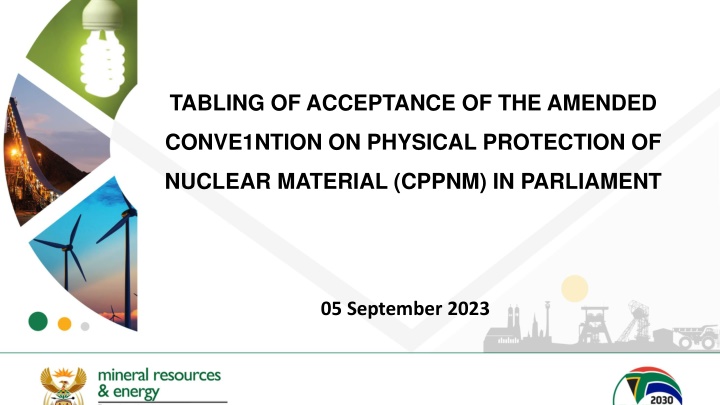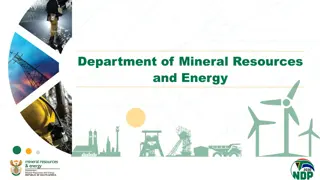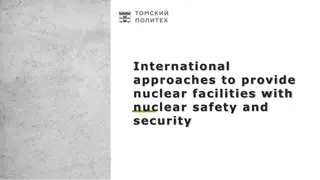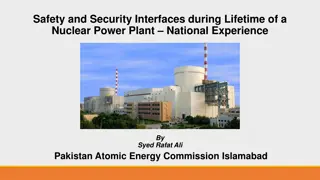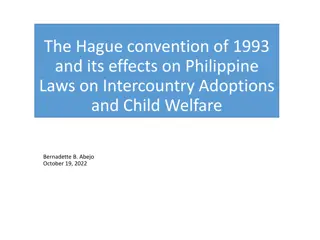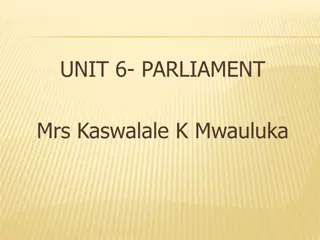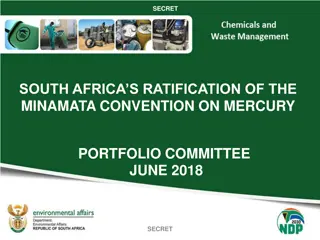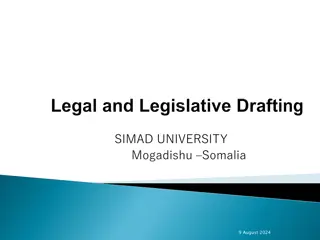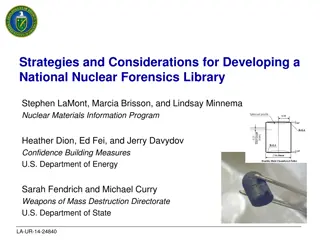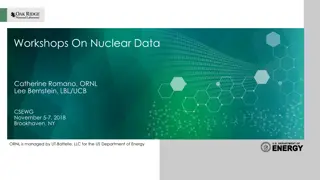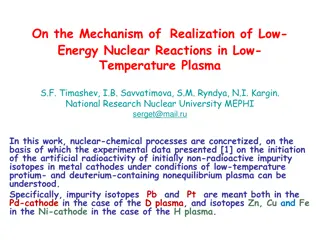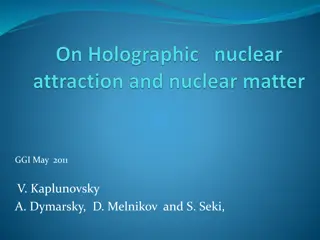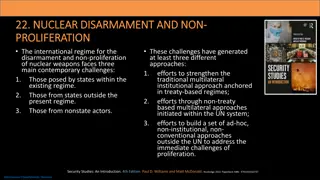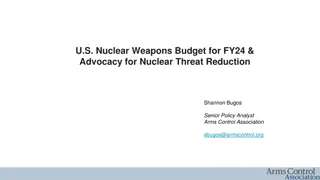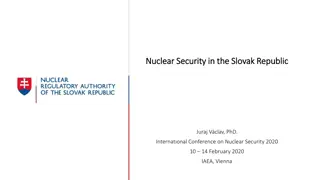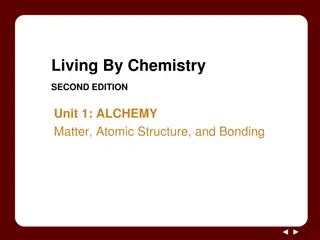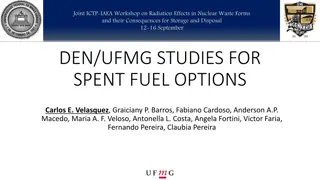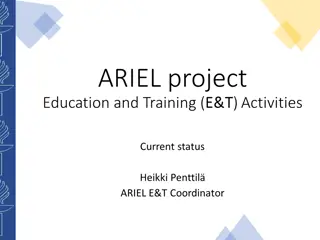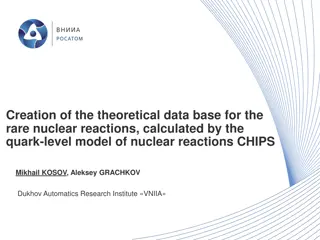Amended Convention on Physical Protection of Nuclear Material Tabling in Parliament
The Amended Convention on Physical Protection of Nuclear Material (CPPNM) is being tabled for acceptance and ratification in Parliament on 05 September 2023. The purpose is to enhance physical protection measures for nuclear material, especially in the face of increased security concerns post the 9/11 incident. South Africa, as a State Party, aims to strengthen provisions to prevent theft and unauthorized use of nuclear material. The Convention focuses on international transport and establishing offenses related to nuclear material. The strategic importance and risks associated with the amended CPPNM are highlighted, urging National Council of Provinces approval.
Download Presentation

Please find below an Image/Link to download the presentation.
The content on the website is provided AS IS for your information and personal use only. It may not be sold, licensed, or shared on other websites without obtaining consent from the author.If you encounter any issues during the download, it is possible that the publisher has removed the file from their server.
You are allowed to download the files provided on this website for personal or commercial use, subject to the condition that they are used lawfully. All files are the property of their respective owners.
The content on the website is provided AS IS for your information and personal use only. It may not be sold, licensed, or shared on other websites without obtaining consent from the author.
E N D
Presentation Transcript
TABLING OF ACCEPTANCE OF THE AMENDED CONVE1NTION ON PHYSICAL PROTECTION OF NUCLEAR MATERIAL (CPPNM) IN PARLIAMENT 05 September 2023
PresentationLayout Purpose Background of the Convention on Physical Protection of Nuclear Material (CPPNM) New obligations on the Amended CPPNM Strategic importance of the CPPNM Status on the Ratification of the CPPNM Implementation Plan Risks and Mitigation Consultation Recommendation NATIONAL LEGISLATION
Purpose To apprise the Select Committee on Land Reform, Environment, Mineral Resources ) and Energy (National Council of Provinces) of the intended Acceptance and ratification of the Amendment to the Convention on the Physical Protection of Nuclear Material (CPPNM) (Annexure A). To recommend that the National Council of Provinces to approve the acceptance and ratification of the Amendment to the Convention on the Physical Protection of Nuclear Material as tabled in Parliament in terms of section 231(2) of the Constitution.
Background of the Convention The Convention on Physical Protection of Nuclear Material (CPPNM) is the only legally binding international undertaking in the area of physical protection of ) nuclear material. The CPPNM was adopted on 26 October 1979 and entered into force on 08 February 1987. The Convention focuses on the physical protection of nuclear material used for peaceful purposes during international transport with the objective of preventing theft or unauthorized use of nuclear material (Annexure B).
Background of the Convention Key provisions of the Convention cover international transport of nuclear material as well as establishment of a list of offences that involve nuclear material. Member States undertake to make these offences (e.g. possession, use or disposal of nuclear material without authorisation) punishable under their National Law (Article 7 of the original CPPNM). South Africa signed the CPPNM on 18 May 1981 and ratified it on 17 September 2007.
Background of the Convention The 9/11 (11 September 2001) incident attack in the USA resulted in the following: Increased security concerns of large-scale terrorism for nuclear facilities Prompted the initiation of the amendment, to expand the scope of the Convention considering terrorism as a threat to nuclear facilities, hence, the amended convention of the physical protection of nuclear material. State Parties to the CPPNM adopted, by consensus, an amendment to the CPPNM to strengthen its provisions on 08 July 2005.
New obligations on the Amended CPPNM The Amendment broadens the scope of the CPPNM to also include physical protection requirements for nuclear facilities and nuclear material in domestic use, storage and transport. Amendment to CPPNM provides for expanded cooperation between and among States regarding rapid measures to locate and recover stolen or smuggled nuclear material, mitigate any radiological consequences of sabotage, prevent and combat-related offences. The Convention also provides for the criminalisation of new and extended specified acts (Paragraph 9 10 of the amended CPPNM) e.g. import or export of nuclear material without authorisation; act directed against a nuclear facility, or interfering with the operation of a nuclear facility.
New obligations on the Amended CPPNM It provides for the sharing of information on potential and actual attacks on nuclear material and facilities, and the provision of assistance if such attacks should occur. It recognises the right of all States to develop and apply nuclear energy for peaceful purposes and their legitimate interests in the potential benefits to be derived from the peaceful application of nuclear energy. The Amendment augments the national security of a State by providing a strengthened international framework which includes the need to implement legislative, regulatory, and administrative obligations
Strategic importance of the Amended CPPNM Protection of nuclear material is indeed one of the most effective ways of preventing or mitigating the catastrophic consequences that could result from terrorists gaining access to nuclear material. Security of nuclear facilities is also recognized as an important aspect that needs national and global attention. Protection of nuclear material and facilities involves a broad range of activities on the international level as well as in individual countries. International law recognizes that each State has responsibility for implementing these measures and for providing adequate protection for the material in its possession. At the same time, the international community has established a set of international arrangements that help to create and maintain the international nuclear security regime hence the importance of ratifying the amended CPPNM.
Strategic importance of the Amended CPPNM It is important to note that the International Community support universalisation of the amendment to the CPPNM, which is regarded as an important step towards making the world more secure, by providing assurance that the same level of physical protection is applied throughout the world. It is recommended that South Africa accept the Amended CPPNM, to: affirm its commitment to providing adequate protection for the nuclear facilities within the Republic and nuclear materials in domestic use, storage, and transport; enable RSA to continue its efforts in securing the supply of energy, through the diversification of energy sources as envisaged in the Integrated Resource Plan (IRP). This will, in part, entail allowing RSA to maintain co-operative relationships with nuclear material supplier states that are party to the Amended CPPNM; and give assurance to the International Community regarding the level of physical protection measures as stipulated in the Convention and enable RSA to continue to participate in international engagements on nuclear security.
Status on the Ratification of the Amended CPPNM The Amended Convention entered into force on 08 May 2016. In order for the Amended Convention to become binding on the Republic, section 231(2) of the Constitution requires that it be approved by Parliament. The process to table the Amended Convention in Parliament was not concluded during 5th Parliament and is thus presented to the 6th Parliament to finalise the ratification process. The Department presented the Amended Convention to the Cabinet on 14 September 2021. The Cabinet granted approval for the Amended Convention to be presented to Parliament in terms of section 231(2) of the Constitution on 14 September 2021. The Amended CPPNM was tabled and approved in the National Assembly on 02 June 2023. It is therefore critical for the National Council of Provinces to approve the acceptance and ratification of the Amendment to the Convention on Physical Protection of Nuclear Material.
Implementation Plan The provisions of the Amendment to CPPNM will be implemented in accordance with the legislative process as stipulated in the Constitution of the Republic of South Africa. The implementation of Amended CPPNM provisions will be in accordance with the following: Nuclear Energy Act; 1999, (Act No. 46 of 1999) National Nuclear Regulator Act; 1999, (Act No. 47 of 1999) National Key Point Act; 1980, (Act No. 02 of 1980) Protection of Information Act; 1982, (Act No. 84 of 1982) National Strategic Intelligence Act; 1994, (Act No. 39 of 1994) Protection of Constitutional Democracy Against Terrorist and Related Activities Act, 2004 (Act No. 33 of 2004) Minimum Information Security Standard document & Design Basis Threat Document Any other relevant legislation.
Risk / Risk mitigation Not ratifying the Amended Convention will result in the following: South Africa will not be contributing to Priority 7 of the MTSF 2019-2024 that is Better Africa for all which is aimed at promoting regional, global integration and improved peace, security and stability on the continent. The Convention provides for cooperation between and among states to implement rapid measures to locate missing nuclear material and addressing consequences of radiological release. South Africa will not be contributing to Priority 2 of the MTSF 2019-2024 (Economic transformation and job creation) which is to secure the supply of energy. Failure to ratify the Amended Convention can be limiting as the suppliers of nuclear material may decide to do business with only state parties to the Amended CPPNM which will affect diversification of energy sources as envisaged in the IRP.
Risks / Risk mitigation Nuclear security is becoming a pre-requisite for cooperation in the peaceful use of nuclear energy, science and technology. Individual supplier states may not supply RSA with Nuclear Material/equipment including fuel based on the fact that RSA has not ratified the Amended CPPNM; current nuclear installations such as Koeberg Nuclear Power Station (KNPS), Nuclear Technology Products (NTP), South African Fundamental Atomic Reactor Installation (SAFARI-1) rely on imported raw materials and may not have access to such for operations. Also the new envisaged nuclear installations such as Multi-Purpose Reactor (MPR), Nuclear New Build Programme (NNBP) and Central Interim Storage Facility (CISF) may be impacted. This will negatively impact the RSA economy. If a Member State does not accede to the Amended Convention, it could be limited from participating in the CPPNM Review Conferences and other nuclear security events. To mitigate the risks, it is crucial for RSA to ratify Amended CPPNM.
Consultation The Amended CPPNM was submitted to both the Department of Justice & Constitutional Development (Office of the Chief State Law Advisor) and DIRCO (Office Chief State Law Advisors: International Law ) for advice. Both Departments confirmed that the provisions of the Amended Convention are consistent with the domestic laws of the Republic of South Africa and International Laws. The Department collaborated with other key stakeholders on matters of nuclear security.
Recommendation It is recommended that the National Council of Provinces: Note that the Amended CPPNM was submitted to both Department of Justice & Constitutional Development (Office of the Chief State Law Advisor) and DIRCO (Office Chief State Law Advisors: International Law) for advice. Both Departments confirmed that the provisions of the Amended Convention are consistent with the domestic laws of the Republic of South Africa and International Laws. Note that Cabinet approved the Amended Convention to be presented to Parliament in terms of section 231(2) of the Constitution on 14 September 2021. The Amended CPPNM was tabled and approved by the National Assembly on 02 June 2023. Approve the acceptance and ratification of the Amendment to the Convention on the Physical Protection of Nuclear Material as tabled in Parliament in terms of section 231(2) of the Constitution.
THANK YOU THANK YOU 17
Annexures Annexure A: The Amendment to the Convention on Physical Protection of Nuclear Material. Annexure B: The Convention on Physical Protection of Nuclear Material.
